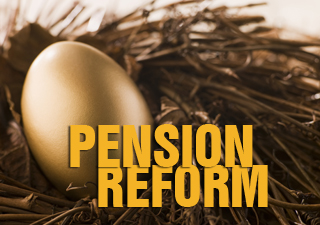Press Release

Pennsylvania Needs True Pension Reform
The state pension time bomb is taking front stage again in the waning days of the 2009-2010 legislative session. The Senate is revisiting HB 2497—the $27 billion pension deferral plan passed by the House in June. In a new video, CF Director of Policy Research Nate Benefield sits down with Senior Fellow Rick Dreyfuss to discuss HB 2497 and the principles of real pension reform.
In a memo sent to legislators this week, CF urged lawmakers to consider true pension reform.
MEMORANDUM
| TO: |
Members of the General Assembly |
| FROM: | Matthew J. Brouillette, Commonwealth Foundation |
| CC: |
Members of the Media |
| DATE: |
October 5, 2010 |
| RE: |
Public Pension Reform |
As the 2009-10 legislative session winds down and the announcement of the death of HB 2497 may have been premature, I would like to reaffirm the need for sustainable and comprehensive public pension reform.
This five-step approach to pension reform is based upon the indisputable need to remove politics from the public pension system. While the current economic downturn has dramatically increased the unfunded liabilities in PSERS, SERS, and thousands of other public pension plans, it is the political nature of defined-benefit pension plans that puts Pennsylvanians in serious financial jeopardy.
The experience in the private sector shows that defined-contribution plans are the only means by which Pennsylvania can remove politics from the public pension system while ensuring that taxpayer costs are “current” (paid for as earned), predictable (in the future) and affordable (not exceeding 7% of payroll after any required employee contributions).
In short, true pension reform must consider the long-term effects and all people (such as SB 566), not simply short-term effects and a few people (such as HB 2497).
Attached is a summary of what true pension reform looks like, followed by a contrast with “non-reform” reforms that have failed in both the private and public sectors. These “non-reforms” represent an easier political solution in an attempt to mollify public employee labor unions, but they create unsustainable risks and liabilities leading to “Generational Theft.”
Fortunately, the people of Pennsylvania support true pension reform. According to an April 2010 poll by Susquehanna Polling and Research Company, voters-Democrats, Republicans, and Independents alike-favor legislation that would place all new government hires in a 401(k)-type retirement plan (such as SB 566), rather than the defined-benefit pension plans in which government workers are currently enrolled.
|
Q: Most government employees – including teachers, state workers, judges, and legislators – receive a pension plan which provides a guaranteed annual payment upon retirement. There is legislation to move all new government employees to a 401(k) type plan, similar to what many employees in the private sector receive. Generally speaking, do you favor or oppose this legislation? |
|||
|
Total Favor |
Total Oppose |
Undecided/Refused |
|
|
All Voters |
54% |
34% |
12% |
|
Republican |
58% |
33% |
9% |
|
Democrat |
50% |
36% |
14% |
|
Independent |
60% |
29% |
11% |
If you would like additional information or would like to further discuss pension reform with me or Rick Dreyfuss, our pension expert and actuary, please contact me at 717.671.1901 or at [email protected] or Rick Dreyfuss at [email protected].


# # #
For more information on state pensions, and HB 2497, download the latest presentation from Mr. Dreyfuss and visit CommonwealthFoundation.org/Pensions
The Commonwealth Foundation (www.CommonwealthFoundation.org) is an independent, non-profit public policy research and educational institute based in Harrisburg, PA.